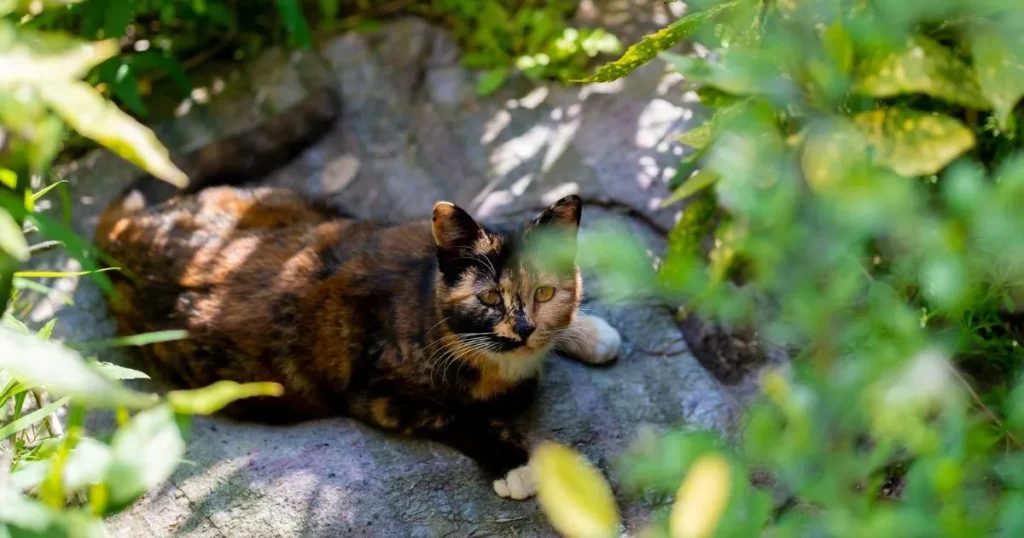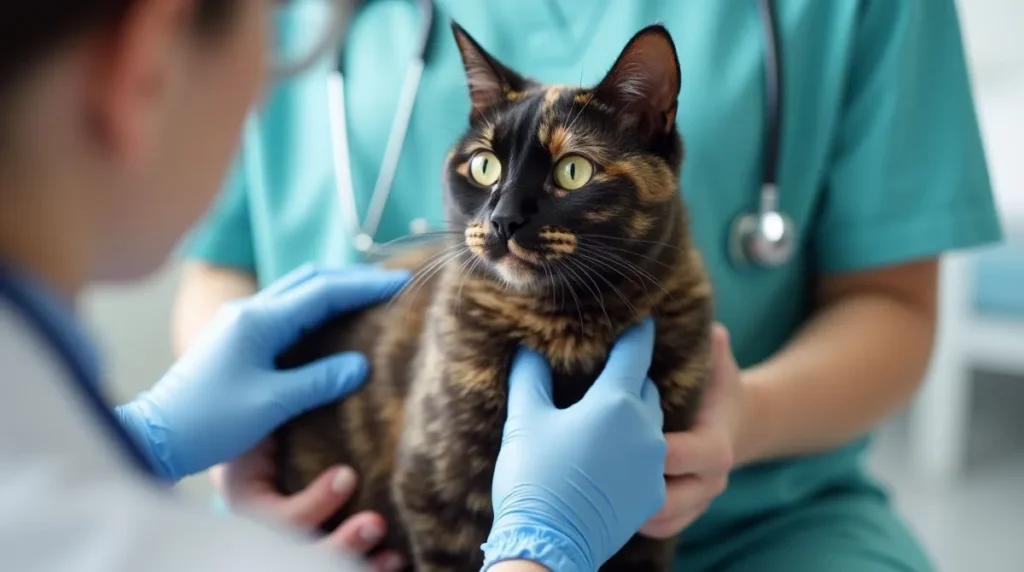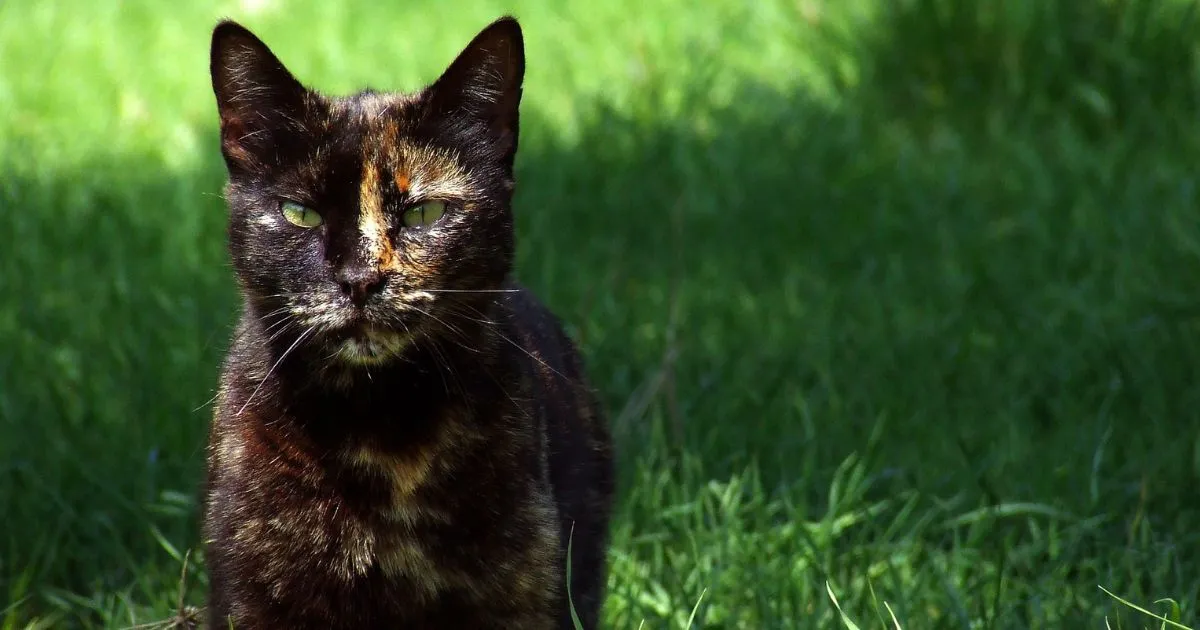Introduction
Are you curious about the Tortoiseshell cat lifespan and how long these beautifully patterned felines can live? Known for their striking coats and unique personalities, tortoiseshell cats captivate many cat lovers. But understanding their average lifespan, the factors that influence their longevity, and how to care for them is crucial for ensuring they lead long, healthy lives. In this guide, we’ll explore 10 amazing facts about Tortoiseshell cat lifespan, including tips on how to keep your feline friend happy and thriving for years to come. Whether you’re a first-time cat owner or an experienced pet parent, this article will provide valuable insights into extending your tortie’s life!
Table of Contents
What Is the Average Tortoiseshell Cat Lifespan?
How Long Do Tortoiseshell Cats Live on Average?
The average lifespan of a tortoiseshell cat typically ranges from 12 to 16 years, similar to other domestic cats. However, with proper care, a tortoiseshell cat can live well beyond this range, reaching up to 20 years or more. Since tortoiseshell is a coat pattern rather than a specific breed, the lifespan depends on factors like genetics, lifestyle, and overall health. Indoor tortoiseshell cats generally live longer than those who roam outdoors, as they are less exposed to risks like traffic, predators, and diseases.
Factors That Affect Tortoiseshell Cat Lifespan
Several factors influence the lifespan of a tortoiseshell cat, including:
- Genetics: Some tortoiseshell cats inherit strong genetic traits that contribute to a longer life, while others may be prone to hereditary health issues.
- Diet: A balanced, high-quality diet rich in essential nutrients helps maintain your cat’s overall health, preventing obesity and related conditions.
- Environment: Indoor cats tend to live longer due to a safer, controlled environment. Providing a stress-free and enriching home can positively impact longevity.
- Regular Veterinary Care: Routine checkups, vaccinations, and timely treatment of illnesses are critical in extending your cat’s lifespan.
Indoor vs. Outdoor Tortoiseshell Cat Lifespan

A tortoiseshell cat’s lifespan is greatly influenced by whether it resides indoors or spends most of its time outdoors. Indoor tortoiseshell cats often live longer, averaging between 14 and 20 years, because they are protected from external dangers such as accidents, predators, and contagious diseases.
In contrast, outdoor tortoiseshell cats may face more risks, resulting in a shorter lifespan, typically around 8 to 12 years. If you have an outdoor cat, consider creating a safe outdoor enclosure or supervised outdoor time to reduce potential hazards and improve their quality of life.
Common Health Issues That May Affect a Tortoiseshell Cat’s Lifespan
Genetic Factors Influencing Tortoiseshell Cat Lifespan
Since the tortoiseshell coat pattern is determined by genetics, tortoiseshell cats may inherit certain health traits from their breed lineage. While the coat pattern itself doesn’t cause health issues, the breed associated with the tortie pattern can influence potential health risks. For example, if a tortoiseshell cat is part of a breed prone to heart disease or kidney issues, these genetic factors can play a role in their lifespan. Additionally, tortoiseshell cats are predominantly female due to their genetic makeup, which may also affect their risk of certain diseases, such as uterine infections or ovarian cancer in unspayed females.
Diseases Common in Tortoiseshell Cats
Although tortoiseshell cats don’t have specific diseases linked to their coat pattern, they can still develop common feline illnesses that may shorten their lifespan. These include:
- Kidney Disease: A common issue in older cats that can significantly impact their quality of life.
- Hyperthyroidism: An overactive thyroid gland, often seen in senior cats, leading to weight loss and other complications.
- Diabetes: Cats that are overweight or have poor diets are more likely to develop diabetes, which requires ongoing management.
Timely detection and proper treatment of these diseases can make a significant difference in prolonging a cat’s life.
Importance of Regular Veterinary Care for Tortoiseshell Cats
Routine veterinary checkups are vital in identifying and managing health issues early. Annual or biannual vet visits help monitor your cat’s overall health, ensuring vaccinations are up to date and dental hygiene is maintained. Regular checkups can also help in early detection of chronic conditions like arthritis, dental disease, or heart problems, which may not be immediately visible. Preventive care, such as flea control, deworming, and proper dental cleaning, further reduces health risks that could negatively affect your tortie’s lifespan.

Obesity and Its Impact on Tortoiseshell Cat Lifespan
Obesity is a significant concern that can drastically shorten a cat’s lifespan by increasing the risk of diabetes, heart disease, and joint problems. Overfeeding, lack of exercise, and an unhealthy diet are common causes of obesity in cats. Maintaining a healthy weight through a balanced diet and regular physical activity helps reduce these risks. Providing interactive toys, cat trees, and scheduled playtime can keep your tortoiseshell cat active and fit.
Nutrition and Care Tips to Extend Tortoiseshell Cat Lifespan
Best Diet for a Healthy Tortoiseshell Cat
Proper nutrition is one of the most crucial factors in ensuring a long and healthy Tortoiseshell cat lifespan. A well-balanced diet that includes high-quality protein, essential fatty acids, and necessary vitamins and minerals helps maintain optimal health. Cats are obligate carnivores, meaning their bodies rely on animal-based proteins to thrive. Look for cat foods that list real meat, like chicken or fish, as the first ingredient. To enhance your cat’s immune defenses, include foods packed with antioxidants like vitamins C and E in its diet. Omega-3 fatty acids, found in fish oils, help promote healthy skin, coat, and joints-key factors in supporting your tortoiseshell’s longevity.
Exercise and Activity for a Longer Tortoiseshell Cat Lifespan
Physical activity plays a vital role in extending a cat’s lifespan by keeping them physically fit and mentally stimulated. Tortoiseshell cats are often energetic and playful, so it’s essential to provide opportunities for exercise. Interactive toys, like feather wands or laser pointers, can encourage your cat to engage in play while providing a bonding experience. Cat trees, tunnels, and puzzle feeders help stimulate their natural instincts, like climbing and hunting, which can prevent boredom and keep them active. Regular exercise also helps maintain a healthy weight, reducing the risk of obesity and related health issues, ultimately contributing to a longer life.
Creating a Safe Environment for Your Tortoiseshell Cat
Creating a safe, stress-free environment is crucial for promoting the Tortoiseshell cat lifespan. Cats thrive in homes where they feel secure and comfortable. Ensure that your home is cat-proofed by removing dangerous items like toxic plants, small objects that could be ingested, and accessible cords. If your cat enjoys outdoor time, consider creating an enclosed outdoor space (also known as a “catio”) to safely experience nature without the risks of cars, other animals, or diseases. Additionally, maintaining a calm environment and offering safe places to hide or sleep can reduce stress and contribute to better overall health, which directly impacts longevity.
Grooming and Hygiene for Tortoiseshell Cats
Grooming is an essential aspect of maintaining your tortoiseshell cat’s health and lifespan. Regular brushing not only keeps your cat’s coat looking beautiful but also helps reduce hairballs, matting, and shedding. Some tortoiseshell cats may have long or medium-length fur, which requires more frequent brushing to prevent tangles and mats. Additionally, Feline dental health is critical, as periodontal disease can lead to more severe health issues like heart or kidney disease. Incorporating regular dental care, such as brushing their teeth or providing dental treats, can make a big difference in your tortoiseshell cat’s overall well-being. Regularly checking their ears, eyes, and claws ensures that they stay in optimal condition and can help catch any potential health problems early.
How Aging Affects Tortoiseshell Cat Lifespan

Physical Changes in Aging Tortoiseshell Cats
As your tortoiseshell cat ages, it’s natural for certain physical changes to occur that may affect their overall health and lifespan. Older cats may experience a decline in muscle mass and bone density, which can lead to reduced mobility or arthritis. Their coat may also lose some of its shine and thickness, often becoming thinner or more coarse. Additionally, aging cats may experience changes in their vision or hearing, which can affect their quality of life. Regular veterinary checkups are crucial in monitoring these changes and providing the necessary care to keep your cat comfortable and healthy in their senior years.
Common Health Issues in Senior Tortoiseshell Cats
As tortoiseshell cats reach their senior years, they become more susceptible to a range of health issues that can shorten their lifespan. Common conditions in older cats include:
- Kidney Disease: Chronic kidney disease is prevalent in senior cats and requires ongoing management to prevent further damage.
- Dental Disease: Gum disease or tooth decay can affect older tortoiseshell cats, causing pain and potential infections.
- Hyperthyroidism: This condition is common in aging cats and can lead to weight loss, increased appetite, and heart issues.
By staying vigilant and addressing health concerns promptly, these conditions can be managed to improve the quality of life for your senior tortoiseshell cat.
Mental and Cognitive Changes in Aging Tortoiseshell Cats
In addition to physical changes, aging tortoiseshell cats may also experience mental and cognitive changes, similar to humans. This condition, called feline cognitive dysfunction syndrome (CDS), can manifest as confusion, disorientation, disrupted sleep patterns, and changes in behavior. Cats with CDS may seem less responsive or even forgetful of familiar people or surroundings. To help your senior tortoiseshell cat manage these changes, provide a consistent routine, enriching toys, and mental stimulation. Cognitive health can be supported through a balanced diet, regular exercise, and special supplements designed for senior cats, all of which can contribute to maintaining their cognitive function.
Importance of Regular Veterinary Care as Cats Age
As your tortoiseshell cat ages, regular veterinary visits become even more crucial. Senior cats should be seen by a vet at least twice a year, or more frequently if they have specific health concerns. These visits allow the vet to monitor for age-related diseases and recommend preventive measures to keep your cat healthy. Blood tests, urinalysis, and dental exams are particularly important for catching underlying health issues before they become more serious. Early detection and treatment of aging-related problems can significantly improve your cat’s quality of life and extend their lifespan.
FAQs About Tortoiseshell Cat Lifespan
What is the Average Lifespan of a Tortoiseshell Cat?
The average lifespan of a tortoiseshell cat typically ranges between 12 to 16 years, with some living even longer if well cared for. However, various factors such as genetics, diet, exercise, and overall health can influence the longevity of any cat. While tortoiseshell cats are not prone to any specific life-threatening conditions due to their coat color, it’s important to maintain a healthy lifestyle and regular veterinary visits to help them live to their full potential. Genetics and proper care play key roles in achieving a longer lifespan.
Do Tortoiseshell Cats Have Longer Lifespans Than Other Cats?
Tortoiseshell cats do not necessarily have a longer lifespan than other cats based solely on their coat color. Their lifespan is more influenced by factors such as breed, genetics, diet, and lifestyle. However, some tortoiseshell cats, particularly those of mixed breeds, tend to be healthier overall due to the hybrid vigor that comes from diverse genetic backgrounds. Regular vet visits, balanced nutrition, and exercise are all critical to ensuring that your tortoiseshell cat enjoys a long and healthy life.
Are Tortoiseshell Cats Prone to Any Specific Health Issues?
Tortoiseshell cats are not specifically prone to any health conditions just because of their coat pattern. However, they can inherit the health concerns associated with the breeds in their ancestry. For example, some tortoiseshell cats may be part of breeds that are more susceptible to conditions such as heart disease, kidney failure, or hyperthyroidism. It’s important to be aware of these potential risks and ensure that regular veterinary care is a priority. Regular checkups will help catch any underlying health problems early and manage them to promote a longer, healthier life.
How Can I Improve My Tortoiseshell Cat’s Lifespan?
To improve the lifespan of your tortoiseshell cat, it’s essential to provide a well-balanced diet, engage in regular physical activity, and offer mental stimulation. Keeping your cat at a healthy weight and ensuring they stay active can help prevent obesity-related conditions like diabetes or joint problems. Regular grooming and maintaining dental health are also important aspects of their overall care. Additionally, ensuring your cat has access to regular veterinary care for checkups and early disease detection can make a significant difference in their longevity. A loving, safe, and stress-free environment is also key to promoting a long, happy life.
What Are the Signs That My Tortoiseshell Cat Is Aging?
As your tortoiseshell cat ages, you may notice a few changes in their behavior and physical condition. Common signs of aging in cats include reduced activity levels, weight changes, difficulty jumping or climbing, and changes in appetite. You may also notice behavioral changes, such as increased vocalization, disorientation, or confusion, which could be indicative of cognitive dysfunction. Pay attention to subtle changes and consult your vet to ensure your aging cat gets the necessary support to remain comfortable and healthy.
Should I Be Concerned About My Tortoiseshell Cat’s Coat Changing with Age?
It’s not uncommon for a tortoiseshell cat’s coat to change as they age. Their fur may become coarser or thinner, and the vibrancy of the coat may diminish slightly. This change is often due to aging or hormonal changes, especially in older cats. While this is usually nothing to be concerned about, it’s important to keep an eye on their grooming habits. A change in coat texture, combined with other health signs like lethargy or weight loss, could indicate underlying health issues that need attention. Regular grooming can also help keep your cat’s coat in good condition and allow you to spot any abnormalities early.
Conclusion: Tortoiseshell Cat Lifespan
The lifespan of a tortoiseshell cat typically ranges between 12 to 16 years, but with the right care, many can live even longer. Their longevity is influenced by various factors such as genetics, diet, overall health, and regular veterinary care. Although tortoiseshell cats aren’t specifically prone to any unique health conditions, it’s important to monitor for common age-related issues, provide a balanced diet, and ensure mental and physical stimulation throughout their life. By being proactive with their health and well-being, you can ensure that your tortoiseshell cat lives a long, happy, and healthy life.
Taking the time to address their nutritional needs, offering regular vet checkups, and being aware of the changes that come with aging will all help extend your cat’s lifespan. With a little love, care, and attention, your tortoiseshell cat can be a joyful and cherished companion for many years.

